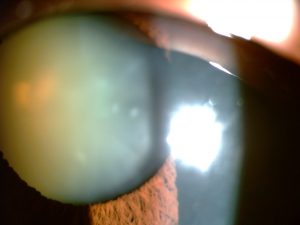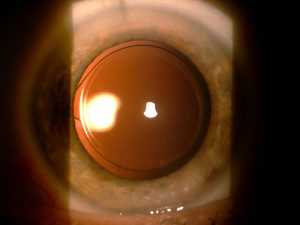How to Prevent Cataract Formation
What are cataracts?
Cataracts are a common eye condition that causes the lens of the eye to become cloudy, leading to blurred vision, decreased color perception, and difficulty seeing at night. Cataracts can occur in one or both eyes and can develop slowly over time or quickly after an injury.
What causes cataracts?
There are several risk factors that can increase the likelihood of developing cataracts, including:
- Age: As we get older, the proteins in the lens of the eye can start to break down, causing cataracts to form.
- Genetics: If you have a family history of cataracts, you may be more likely to develop them.
- Lifestyle factors: Smoking, excessive alcohol consumption, and exposure to UV radiation from the sun can all increase the risk of cataract formation.
- Medical conditions: Certain medical conditions such as diabetes and high blood pressure can increase the risk of developing cataracts.

Dense Cataract
- Medications: Long-term use of corticosteroids and other medications can increase the risk of cataract formation.
How can cataracts be prevented?
While there is no surefire way to prevent cataracts, there are several steps you can take to reduce your risk of developing them:
- Protect your eyes from UV radiation: Wearing sunglasses that block out 100% of UV radiation can help to reduce the risk of cataracts caused by damaging light from sun exposure.
- Quit smoking: Smoking has been linked to an increased risk of cataract formation, so quitting smoking can help to reduce your risk.
- Manage diabetes and high blood pressure.
- Eat a healthy diet: Eating a diet rich in antioxidants and nutrients such as vitamins C and E may help to reduce the risk of cataract formation. A research into dietary intake and risk of cataract formation has shown that diet rich in Vitamin C is protective. Fruits and vegetables that contain high vitamin C include orange, kiwi, broccoli and green leafy vegetables.(1) Multivitamin capsules are NOT helpful.
- Limit alcohol consumption: Excessive alcohol consumption has been linked to an increased risk of cataract formation, so it is important to drink in moderation.
- Get regular eye exams: Regular eye exams can help to detect cataracts early, when they are easier to treat.
Can cataracts be treated?
Yes, cataracts can be treated with surgery. During cataract surgery, the cloudy lens is removed and replaced with an artificial lens. Cataract surgery is a safe and effective procedure, and most people experience significant improvement in their vision after surgery.

Clear intra-ocular lens after cataract removal.
In some cases, cataracts may not need to be treated immediately, and your eye doctor may recommend monitoring the cataract over time to see if it worsens.
What are the risks of cataract surgery?
Like any surgery, cataract surgery carries some risks. These risks include:
- Infection
- Bleeding
- Swelling
- Vision loss
- Retinal detachment
- Glaucoma
However, these risks are relatively low, and most people experience significant improvement in their vision after cataract surgery.
How can I prepare for cataract surgery?
If you and your eye doctor have decided that cataract surgery is the right choice for you, there are several steps you can take to prepare for the procedure:
- Arrange for someone to drive you home after surgery: You will not be able to drive immediately after surgery, so it is important to arrange for someone to drive you home.
- Follow your doctor’s instructions: Your doctor will provide you with instructions to follow before and after surgery. It is important to follow these instructions carefully to ensure the best possible outcome.
- Avoid eating or drinking before surgery: Your doctor will likely instruct you not to eat or drink anything for several hours before surgery.
- Discuss any medications with your doctor: Some medications may need to be stopped or adjusted
(1) https://www.aaojournal.org/article/S0161-6420%2816%2900114-7/abstract


